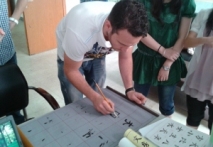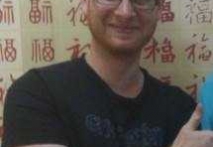Latest News
- Wuxi's Nanchang Street--a historic cultural district that combines classical charm, delicious food, and fun activities
- chinese study
- lastest courses
- Business Assistance/International Consortium of Stem Cell Research
- Foreigner's view of Jiangsu -Changzhou Jintan starts
- estimonials for Our new French Internship student Anais 企业表扬信
- The Double Seventh Festival in China Introduction
- Chinese Proficiency Test (HSK)
- China University Mining and Technology
- Wuxi Library
Students Say
Mandarin Student Zack
Mandarin Education School is a great place to learn Chinese and Chinese Culture.I've learned a lot in this school, my Chine...
Learn Chinese Travel China
If you want to learn Chinese and also discover China, Mandarin Education organize the most funny and cultural study tour.
The...
suzhou Mandarin Jude
I am Jude, I am learning Mandarin in Suzhou Mandarin School,I was learning in Wuxi Mandarin Education too.I like my Chinse Teacher...
chinese class
Improve your reading, speaking and your writing by experiencing our teaching methods,Offer free student Visa.
...
Wuxi Mandarin Jessie
I've learned Chinese for almost 8 years, I can understand what Chinese people say,but when I speak, I feel very uncomfor...
Chinese Internship or Jobs
You are looking for a professional experience abroad? Get the opportunity to discover the Chinese business,Look for an ...
Mandarinedu Student Florent
I love my Wuxi Mandarin Education School. It is the EASY MANDARIN Learning way, I am learning faster than I wanted.My teach...
Mandarin E Learning
Mandarin Education School offers you Online Chinese Courses. It has never been so easier to have Chinese courses ...
Mandarin Student Brad
I am studying Chinese in Mandarin Education School. I can speak quit good Chinese and talk to Chinese people by myself. Thank...
Wuxi Mandarin edu. Student Jennifer
I love learning Chinese in Mandarin Education School.That's a great place to learn and make friends.
...
Add Our School Official
to get more informations

0086 1866 1199 988
0086 510-81151808
Sandy.Swun
519988808
Mandarin Education School
Room 405, 4 Fl,Building No.8,
Maoye Business Center,
Chang jiang No.1,
New district , Wuxi City , China
Whilst it’s important to learn grammar in detail in small chunks, it can be very useful to get familiar with some general Chinese grammar rules. These aren’t specific grammatical structures, but general facts about the Chinese language that apply in most cases. They can help you get a feel for Mandarin Chinese and how it works.
Chinese grammar rule #1: What precedes modifies what follows
This rule sounds a little bit complicated when you first see it, but it’s actually quite straightforward. It simply means that modifiers come before the thing they modify. The Chinese language, right through from the written classical language to the modern spoken vernacular, has always had this rule.
Let’s look at some simple examples to demonstrate this rule.
他不喜欢 贵的 东西。
Tā bù xǐhuan guì de dōngxi.
He doesn't like expensive things.
我哥哥 慢慢地 开车。
Wǒ gēgē mànmande kāichē.
My brother drives slowly.
她能喝 很多 啤酒。
Tā néng hē hěnduō píjiǔ.
She can drink a lot of beer.
As you can see in each of the Chinese sentences, the modifier (colored red) comes before the thing it modifies. 贵的 (expensive) comes before 东西 (things), 慢慢地 (slowly) comes before 开车 (drive) and 很多 (a lot of) comes before 啤酒 (beer). Notice how the position of the modifier varies in the English sentences.
Knowing about this ‘modifiers first’ rule in Chinese grammar can be very helpful in the early stages of your Chinese studies. It lets you follow the structure of sentences more quickly because you can identify modifiers (adjectives and adverbs) and the things they’re modifying (nouns and verbs) more easily.
It also lets you form sentences with more confidence because you know that adjectives should be placed before the nouns they modify, and adverbs should be placed before the verbs they modify.
Rule #2: Words do not change
Unlike in European languages, words in Chinese do not change. They have a fixed form that is the same no matter what they’re used for or where they appear in a sentence. In Chinese, you don’t conjugate verbs and you don’t make adjectives agree. According to Chinese grammar rules, a word is a word.
Have a look at these examples that illustrate this point:
她去工作。
Tā qù gōngzuò.
She goes to work.
我去工作。
Wǒ qù gōngzuò.
I go to work.
他们去工作。
Tāmen qù gōngzuò.
They go to work.
我们去工作。
Wǒmen qù gōngzuò.
We go to work.
These simple sentences show that verbs do not change in Chinese, whereas they do in English. The verb 去 (qù) is the same in every sentence and doesn’t change. These sentences would be even more varied in a language like French, but in Chinese the verb is the same every time.
It’s not just verbs that never change according to Chinese grammar rules. Adjectives are also fixed in their form and are the same no matter what noun they modify. Let’s see some examples:
这是一辆 黑色的 车。
Zhè shì yī liàng hēisède jū.
This is a black car.
我看到了一些 黑色的 猫。
Wǒ kàn dàole yīxiē hēisède māo.
I saw some black cats.
这是一件 黑色的 衬衫。
Zhè shì yī jiàn hēisède chènshān.
This is a black shirt.
The adjective in these sentences, 黑色的 (hēisède), is the same for each of the items. There is no gender or grammatical number in Chinese grammar rules.
Rule #3: Chinese is topic-prominent
This is a rule that English-speakers often find hard to get used to. Chinese is topic prominent. This means that it puts the thing the sentence is about first. English is subject prominent, which means that it puts the doer of an action (the subject) in a sentence first.
If you haven’t studied grammar before, you might not be familiar with these terms. The subject in a sentence is the thing that performs the action of the verb. The subject of the following sentences is colored red:
He likes cheese.
You are awesome.
New York is exciting.
We eat rice.
English and other European languages usually prefer to put the subject first, as you can see in the sentences above. But Chinese and other East Asian languages often prefer to put the topic of the sentence first.
The topic of a sentence isn’t as clear as the subject. The topic is not a grammatical role, but the thing that the sentence is about. It’s the main point of the sentence. It’s also called the theme of the sentence for this reason.
I've finished my work.
In this sentence the subject is “I”, but that’s not really what the sentence is about. The sentence is not about the speaker, it’s about the work. So the topic of this sentence is “the work”.
Because Chinese is topic-prominent, it’s often possible and very natural to put the topic first in a sentence rather than the subject. It is also possible in English, but it sounds much less natural, as you can see in the following examples:
红酒我不太喜欢。
Hóngjiǔ wǒ bù tài xǐhuan.
Red wine, I don't really like.
法国我没去过。
Fàguó wǒ méi qùguò.
France, I haven't been to.
一支笔有吗?
Yī zhī bǐ yǒu ma?
A pen - got one?
The sentences above are perfectly permissible according to Chinese grammar rules, but quite odd in English. Note that you could also form the Chinese sentences with the subject first and they would be just as grammatical.
Also notice that the last sentence doesn’t include the subject (you) at all. This is possible because Chinese grammar is primarily interested in the topic (a pen) and not the subject.
Rule #4: Aspect, not tense
Another big difference between European languages and Chinese is aspect and tense. European languages usually indicate both things in a sentence, whereas Chinese tends to only indicates aspect.
Again, you might not be aware of what these terms mean. Tense is about when an action took place relative to now, when we’re speaking. Aspect is about the completeness of an action relative to when it took place. Have a look at these two sentences in English to see the difference:
I will set off to Beijing.
I will have set off to Beijing.
Both sentences are in the future tense. But the aspect is different, because the completeness of the action (setting off to Beijing) is different in the time frame of each sentence. The speaker hasn’t yet set off to Beijing in either sentence. In the time frame they’re speaking about in the second sentence, though, they will have. So the aspect is different (the action is complete in that time frame).
How Chinese marks for aspect is difficult and quite complex. It revolves around a few particles, most importantly 了 (le), but we won’t go into details of that here. The lesson here is to bear in mind that Chinese doesn’t mark for tense, but it does mark for aspect. This will take some getting used to, but you will get there eventually!
Rule #5: Chinese is logical
Finally, we come to the most general rule about Chinese grammar. One of the joys of studying Chinese is that on the whole it’s a very logical, consistent language. This is very true in Chinese vocabulary, as you can usually see very clearly the logic behind most words. It’s also true in Chinese grammar rules, which tend to be consistent and reusable once you’ve learned them.
One example of this is that Chinese tends to only indicate things once in a sentence. For example, if the time has already been made clear, it doesn’t need to be indicated again. Similarly, the number of a noun only needs to indicate once in most cases. More of these examples crop up as you get further into the language. Try to bear this point in mind and you will often find that you can guess how to say new things with some accuracy.










